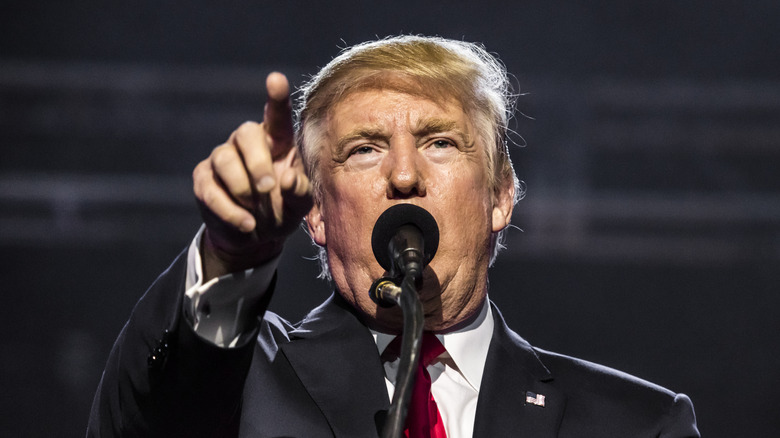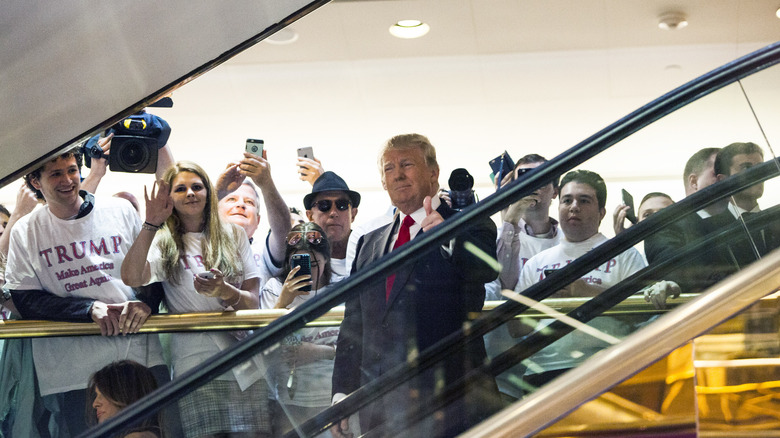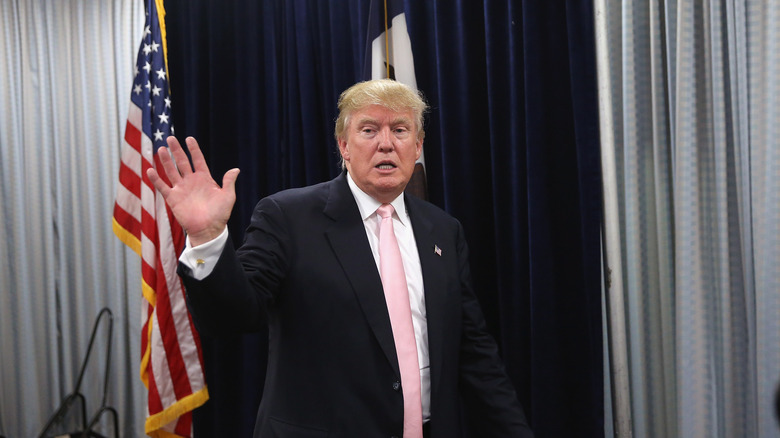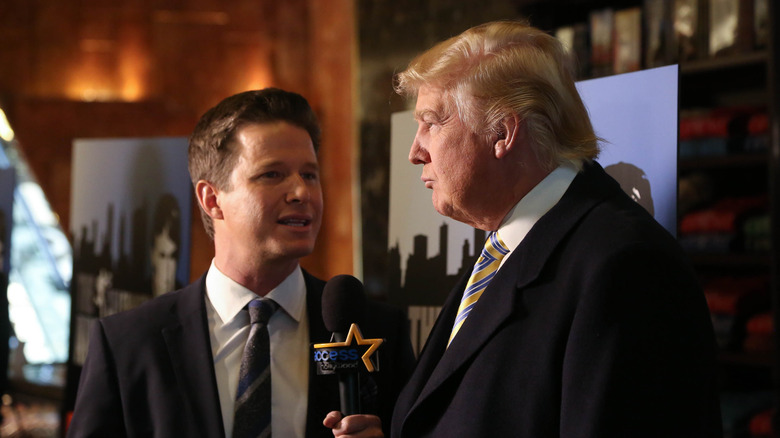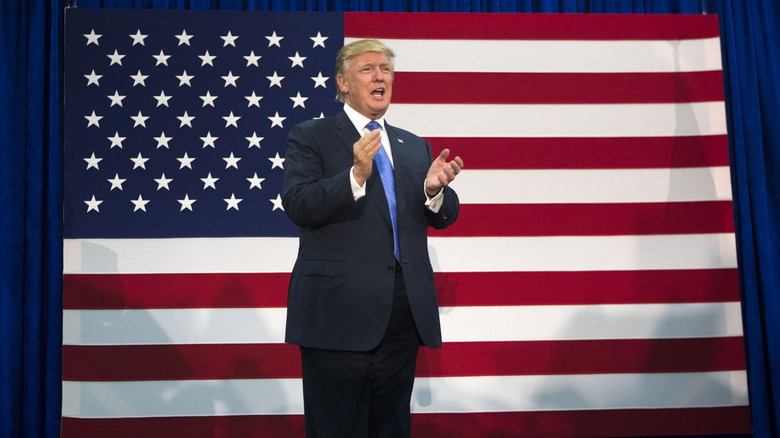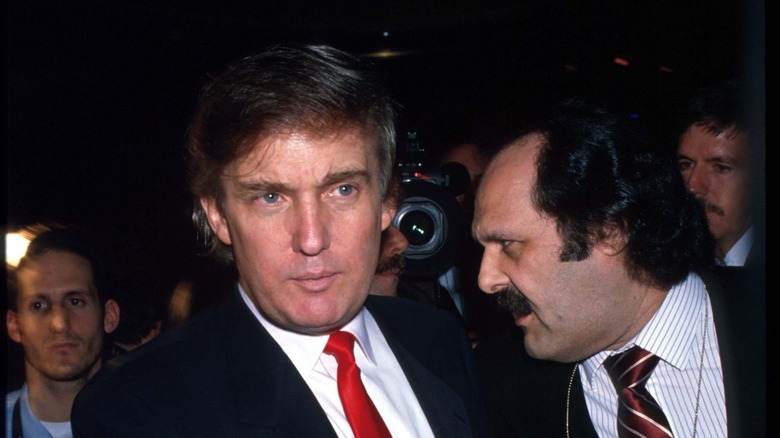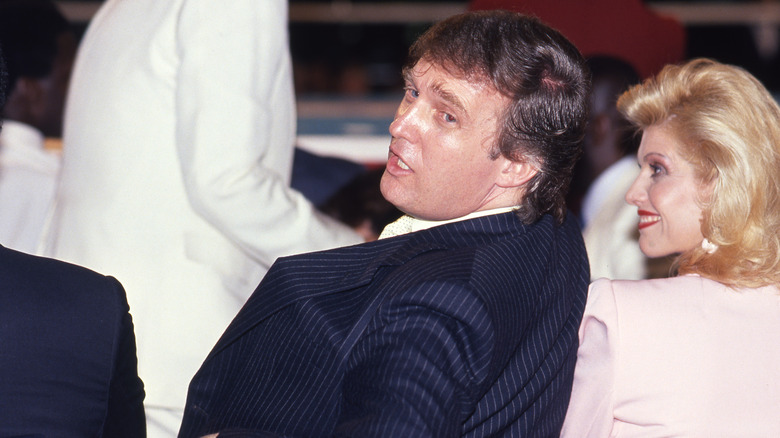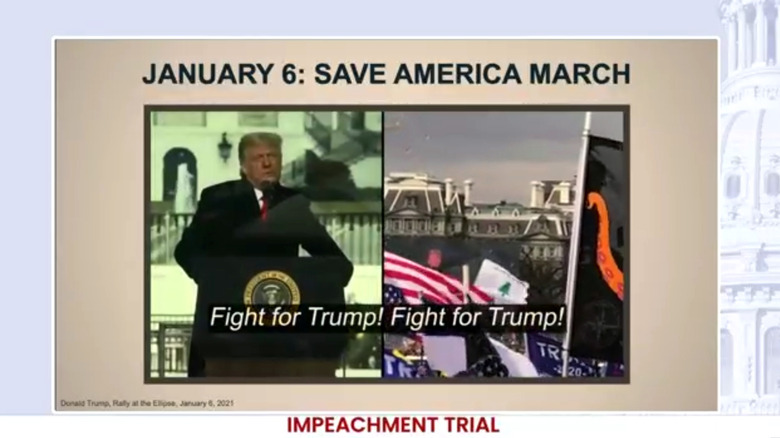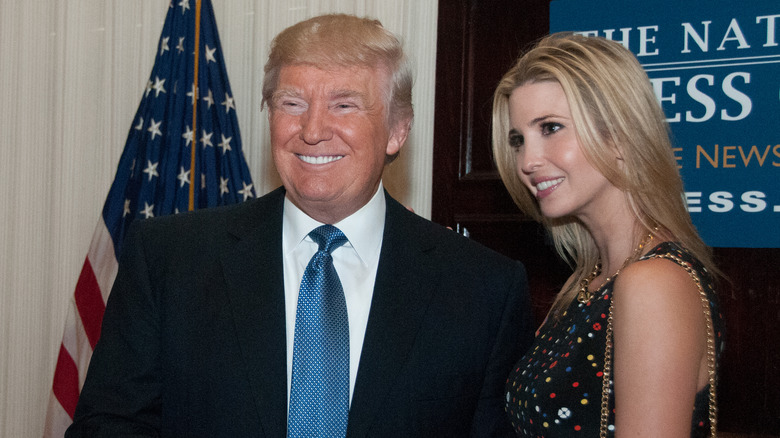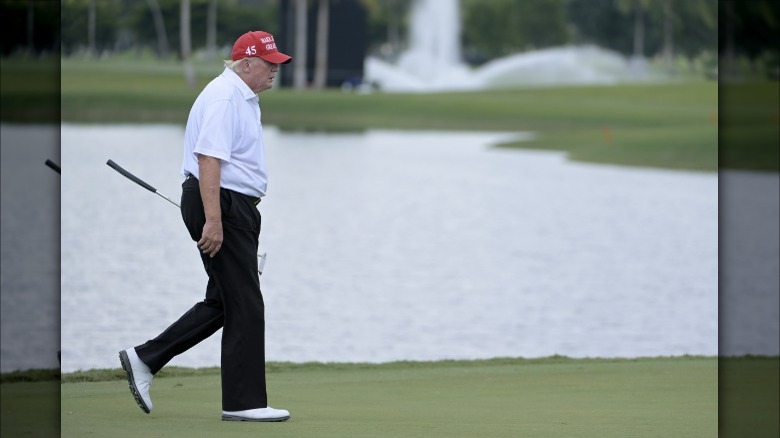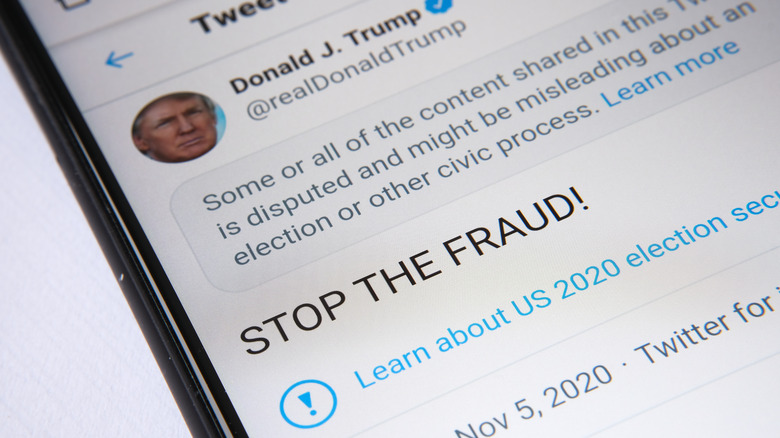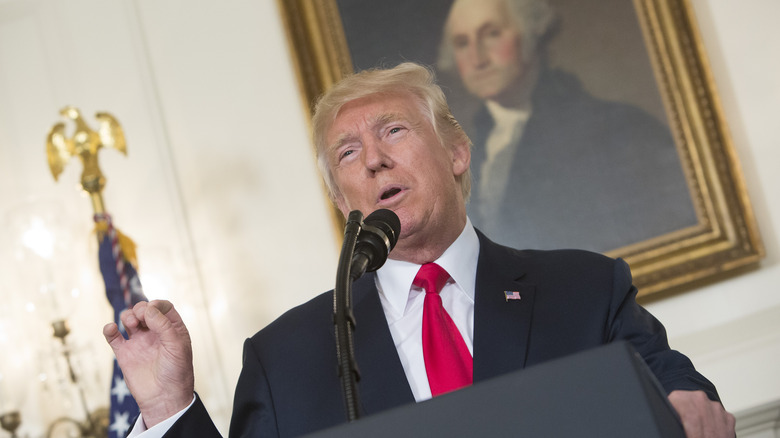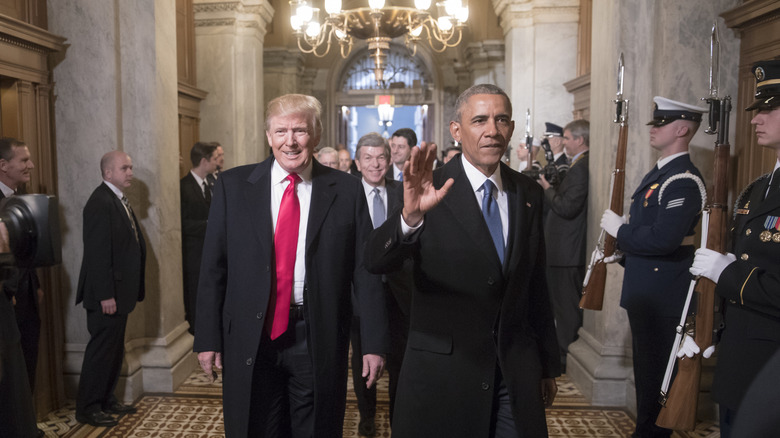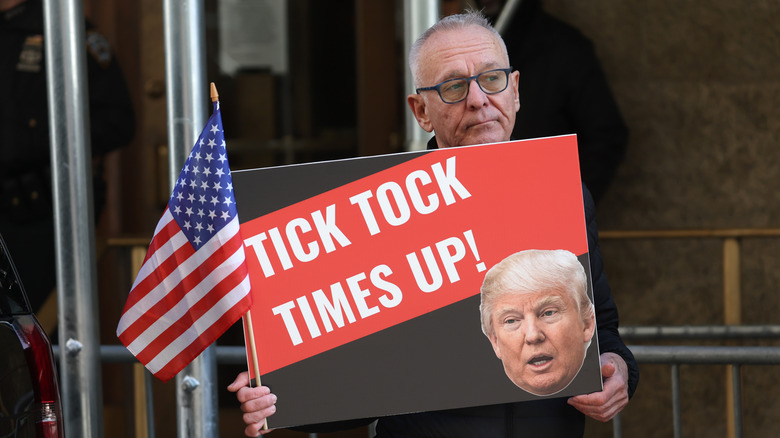The Worst Things Donald Trump Has Ever Said
The former president and reality TV star Donald Trump is a genius when it comes to getting the attention of the public and putting himself at the center of the media cycle. Even before his White House campaign in 2016, few businessmen in the history of the United States made as many appearances on TV and radio as Trump.
And almost as if to intentionally amplify his reach, such appearances often included Trump making some outrageous remarks about his own wealth, about race or gender in America, or divisive criticisms of American society. When he announced in 2015 his intention to run for the presidency, such rhetoric became the meat of his campaign as he sought to build a groundswell of popular support for his Republican candidacy (via The Guardian).
But while much of what Trump has to say evidently plays well to his supporters, who even years after he left the White House still number in the many millions, many of his public pronouncements have been widely criticized by Democrats and Republicans alike. Similarly, the unearthing of private comments made by Trump in the past has also threatened to damage his standing. Here are some of the most controversial quotes attributed to Trump, and the effects such outbursts have had on his supporters, opponents, and ultimately, his place in American politics.
'They're rapists'
Donald Trump's 2016 presidential campaign ran on a virulent anti-immigration ticket, with the former reality TV star focusing on illegal migration over the Mexican border as an issue through which to garner political support. But more than any other anti-immigration politician, Trump used his campaign rallies to compound ill will toward potential Mexican migrants with some outrageous comments that he delivered from Trump Tower on the occasion of his campaign announcement.
"When Mexico sends its people, they're not sending their best," he said. "They're not sending you. They're not sending you. They're sending people that have lots of problems, and they're bringing those problems with us. They're bringing drugs. They're bringing crime. They're rapists." However, Trump then qualified his statements: "And some, I assume, are good people" (via CBS News).
Trump has repeatedly defended and doubled down on his original statement, telling a rally in West Virginia in 2018: "With us, it's a lottery system ... You can imagine what those countries put into the system. They're not putting their good ones ... And remember my opening remarks at Trump Tower, when I opened. Everybody said, 'Oh, he was so tough,' and I used the word 'rape.' And yesterday, it came out where, this journey coming up, women are raped at levels that nobody has ever seen before. They don't want to mention that."
If you or anyone you know has been a victim of sexual assault, help is available. Visit the Rape, Abuse & Incest National Network website or contact RAINN's National Helpline at 1-800-656-HOPE (4673).
John McCain was 'not a war hero'
One of the biggest threats to Donald Trump's tilt at the presidency emerged merely a month after he announced his campaign in the lobby of Trump Tower in 2015. And that threat was entirely his own making — the result of an egregious attack on Arizona senator and former Republican presidential hopeful, John McCain.
Prior to his long political career, McCain spent many years in the U.S. military. He fought in the Vietnam War and was captured and kept in a prisoner-of-war camp, where he was repeatedly tortured. His experiences were often described as heroic by both McCain's allies and his opponents.
However, Trump raised the hackles of many across the political spectrum in June 2015 when he sought to negate McCain's war experience, telling a Republican forum that McCain "is not a war hero. He's a war hero because he was captured. I like people who weren't captured" (via The New York Times). Initially, political commentators who already saw Trump's presidential campaign as an aberration believed that the statement would effectively kill his chances of gaining the Republican nomination. But as the world now knows, that's not how things played out.
'Grab 'em by the p****'
If there was any moment during his 2016 presidential campaign it looked as though public opinion would decisively turn against Donald Trump, it was in the wake of the leak of a now-notorious recording commonly known as "The Access Hollywood Tape." The tape in question was of a lewd conversation held privately between Trump and TV show host Billy Bush, recorded in 2005, in which the two discuss women, sex, and fame. As a transcript of the recording published by The New York Times shows, Trump told Bush: "I'm automatically attracted to beautiful [women] — I just start kissing them. It's like a magnet. Just kiss. I don't even wait. And when you're a star, they let you do it. You can do anything ... Grab 'em by the p****. You can do anything."
But the Access Hollywood Tape wasn't just an isolated insight into how the presidential nominee expressed his attitude toward women in private. One immediate consequence of the outrage was that several women came forward with instances of historical sexual assault allegedly committed by Trump. Trump denied the accusations, and even used a speech in Gettysburg, Pennsylvania, to threaten the women who had spoken out with legal action.
Ultimately, the Access Hollywood Tape didn't prove to be the campaign killer that many Trump critics had thought. In a presidential debate with Hillary Clinton, Trump dismissed his comments as "locker room talk," a sentiment that was echoed by his wife, Melania, who told CNN that her husband had been "egged on" by Bush.
If you or anyone you know has been a victim of sexual assault, help is available. Visit the Rape, Abuse & Incest National Network website or contact RAINN's National Helpline at 1-800-656-HOPE (4673).
'Blood coming out of her wherever'
Donald Trump has a history of criticizing women in what many describe as misogynist terms. When Trump was running to be the Republican presidential nominee in 2015, Fox News anchor Megyn Kelly questioned the billionaire about his past comments ... and wound up on the receiving end of his ire.
After Kelly grilled Trump over past comments about public women whom he'd described variously as "fat pigs, dogs, slobs, and disgusting animals," Trump spoke to CNN's Don Lemon and dismissed Kelly as "lightweight" and "overrated" as a journalist. Speaking of her aggressive questioning, Trump commented: "She had blood coming out of her eyes. Blood coming out of her ... wherever." The outburst, which the majority of news outlets took as a sexist reference to menstruation, caused widespread outrage.
The journalist Laura Bennett, however, has questioned whether Trump was actually alluding to menstruation when he made the comments, though she does note that Trump has a history of sexist behavior.
'Laziness is a trait in Blacks'
This jaw-droppingly racist statement reportedly came from Donald Trump in the early 1990s, in reference to one of his own employees in the Trump Organization. Its source is a man named John R. O'Donnell, who worked for Trump from 1987 to 1990, and who released the book "Trumped! The Inside Story of the Real Donald Trump" in 1991. In the book, O'Donnell recalls a conversation he had with Trump over lunch at Trump Tower, in which Trump attempted to get O'Donnell's opinion on various employees in the company. At the mention of a particular Black employee, Trump reportedly said: "I think that the guy is lazy. And it's probably not his fault because laziness is a trait in Blacks. It really is, I believe that. It's not anything they can control."
While this part of the conversation has become the most widely known, the truth is it came, after another similarly offensive utterance from Trump, according to O'Donnell, in which he also complained about employing Black accountants, invoking Jewish stereotypes in the process: "I hate it. The only kind of people I want counting my money are short guys that wear yarmulkes every day."
'A well-educated Black has a tremendous advantage'
Although the concept of white privilege only came into the mainstream discourse around the time of the formation of the Black Lives Matter movement in the mid-2010s, it has been discussed in academic circles for far longer. Similarly, Donald Trump has also been denying its existence for far longer than the phrase has been widely known — though not exactly in academic terms.
As reported recently by MSNBC, in 1989 Trump gave an interview to Bryant Gumble in which he said, "A well-educated Black has a tremendous advantage over a white in terms of the job market ... if I was starting off today I would love to be a well-educated Black because I believe they do have an actual advantage."
In the interview, Trump voiced his hope that there were Black people in the audience and watching at home who would hear what he was saying and take it on board, suggesting that the mogul believed what he was saying was in some way motivational, rather than a denial of the existence of systemic racism in the U.S.
'Fight like hell'
The events of January 6, 2021 were like no other in recent American history, with civilians seemingly intent on hobbling the wheels of democracy as they turned. And for many critics, what has come to be known variously as the Capitol Hill Insurrection, the Capitol Hill Riot, or simply January 6th, was certainly enflamed by the outgoing president, Donald Trump.
Trump's comments, which were delivered to a large crowd of his supporters at the Ellipse in the vicinity of the White House, included: "And we fight. We fight like hell And if you don't fight like hell, you're not going to have a country anymore ... Our country has had enough. We will not take it anymore and that's what this is all about ... We will stop the steal" (via NPR). The speech was greeted with chants from the crowd throughout, including a chant of "fight for Trump," according to the same source.
Trump, however, denied that the speech was an attempt to incite violence, though his words were later highlighted in his second impeachment trial (pictured). In the speech, Trump also told his supporters that it was important that Pence "comes through" for them in terms of blocking the inauguration of Joe Biden, and it was later revealed how he had pressured Pence, urging him not to "wimp out" of overthrowing American democracy.
He would date his own daughter
Donald Trump's unacceptable comments about women aren't just reserved for his enemies: sometimes he has been known to make them about his own family.
Donald, for example, has frequently baffled and grossed out audiences and interviewers with what can only be described as creepy comments about his daughter Ivanka. As reported by CNN, in 2006, Donald and his daughter appeared on the TV show "The View," where he said that if he weren't Ivanka's father "I might be dating her." Though perhaps dismissible as an awkward attempt at a compliment, in another interview with Howard Stern the same year, he also described Ivanka as "voluptuous," which the same source claims are just two instances of a pattern of behavior in which Donald talks about his daughter in sexualized terms.
In another bizarre example while on a joint appearance on "The Wendy Williams Show," Donald was asked what he and his daughter had in common. The future president replied "sex," to shocked laughter from the audience and a baffled look from Ivanka.
Gay marriage is like a 'weird' golf fad
The topic of gay marriage was a hot one around the time that Donald Trump was mulling a run at the White House in 2011. As a result, he frequently referred to it in various public appearances in which he attempted to form a base of support for his future campaign. And of course, he ended up talking about it in the oddest way possible, using an extended golfing metaphor that seems lighthearted on the surface, but which allowed him to speak about homosexuality in bigoted terms.
"It's like in golf ... lot of people — I don't want this to sound trivial — but a lot of people are switching to these really long putters, very unattractive ... It's weird," he was reported as telling supporters in Las Vegas, per The New York Times. "You see these great players with these really long putters, because they can't sink three-footers anymore. And, I hate it. I am a traditionalist. I have so many fabulous friends who happen to be gay, but I am a traditionalist."
As strangely humorous as the metaphor might be on the surface and despite Trump's claim of having gay friends, it was the "weirdness" of gay marriage and his "hate" for it that this section of his speech was intended to telegraph to his future voters.
'Frankly, we did win this election'
Donald Trump broke with tradition — dangerously so — in failing to congratulate Joe Biden on his 2020 presidential election win, and his subsequent attempt to subvert democracy by asserting that the result was far from settled. Calling the election a "fraud on the American public [and] an embarrassment to our country," Trump told a crowd of supporters: "We were getting ready to win this election, frankly, we did win this election" (via Bloomberg Television).
In the immediate aftermath of the election, Trump attempted to pressure figures such as Georgia Secretary of State Brad Raffensperger, whom he attempted to convince to "find" him more votes in the state — just one of many tactics employed by Trump and his supporters in an effort to change the result of the 2020 election and to undermine Joe Biden's victory. Years down the line, polls suggest that a large proportion of Republican voters still believe that the election was stolen from Trump.
There are 'very fine people on both sides'
In August 2017, the city of Charlottesville, Virginia saw scenes of appalling violence amid ongoing confrontations between a white supremacist rally formed by the group "Unite the Right," and a large group of anti-racism counter-protesters, which led to the death of one woman from the latter group.
In the aftermath, Donald Trump gave a press conference from Trump Tower about a new infrastructure bill that he hoped would gain bipartisan approval. Of course, reporters also pressed him on the terrible events occurring in Charlottesville, at which point the billionaire gave one of the most controversial utterances of his presidency. Instead of admonishing the white supremacist rally, Trump declared, "They didn't put themselves down as neo-Nazis, and you had some very bad people in that group. But you also had people that were very fine people on both sides" (via Politico).
The comment drew widespread outrage, and he later seemed appeared to backtrack. On the anniversary of the violence in Charlottesville, he published a tweet condemning racism and violence. However, a year after that he defended what he had originally said, saying that he answered the question "perfectly."
If you or a loved one has experienced a hate crime, contact the VictimConnect Hotline by phone at 1-855-4-VICTIM or by chat for more information or assistance in locating services to help. If you or a loved one are in immediate danger, call 911.
'Barack Obama's birth certificate is a fraud'
The idea that the Hawaiian politician Barack Obama was not in fact born in the United States was a conspiracy theory that dogged his presidential campaign and presidency beginning in 2008. It was arguably telling that such a theory would emerge only for the first Black president of the United States. And it was also revealing that the conspiracy theory's loudest proponent at the time was Donald Trump.
With presidential ambitions but having yet to take any form of political office, Trump repeatedly questioned Obama's given birthplace. And in typical conspiracy theorist fashion, when the Obama White House officially released the president's birth certificate, Trump took to Twitter to question its authenticity, claiming: "An 'extremely credible source' has called my office and told me that @BarackObama's birth certificate is a fraud."
Though Trump eventually abandoned the racist theory after he had become the Republican presidential nominee in 2016, in 2020 he instigated a similar campaign against Joe Biden's running mate Kamala Harris. This time, Trump echoed the beliefs of a conservative lawyer who claimed that Harris, who was born in Oakland, California, and whose father was Jamaican and whose mother was Indian, was not eligible to hold the vice presidency as her parents were not naturalized citizens at the time of her birth.
Trump's prediction of violence
Donald Trump found himself beset by growing legal troubles in the years since the end of his presidency, with the net finally closing around him in March 2023 with the news that he had been criminally indicted over falsified business records related to hush-money payments made on his behalf to the adult films star Stormy Daniels, with whom he allegedly had an affair.
As rumors spread that investigations into Trump were leading to that development, Trump himself took to his social media platform Truth Social to warn prosecutors that his base would not stand for it, according to CNN. In what is interpretable as a threat, Trump claimed that the "potential death & destruction in such a false charge could be catastrophic for our Country[.]" Trump went on to imply that the prosecutors involved were themselves at fault, stating that "[o]nly a degenerate psychopath who truely [sic] hates the USA" could have charged him.
The comments came alongside a campaign against Manhattan District Attorney Alvin Bragg, which included sharing an article with a header image of Trump holding a baseball bat alongside an image of Bragg, which has been interpreted as an attempt to intimidate prosecutors. Bragg's office has confirmed that they have received countless death threats from Trump supporters, including a letter that contained a white powder. Commentators have suggested that such material may lead to Trump facing further indictments as a result.
